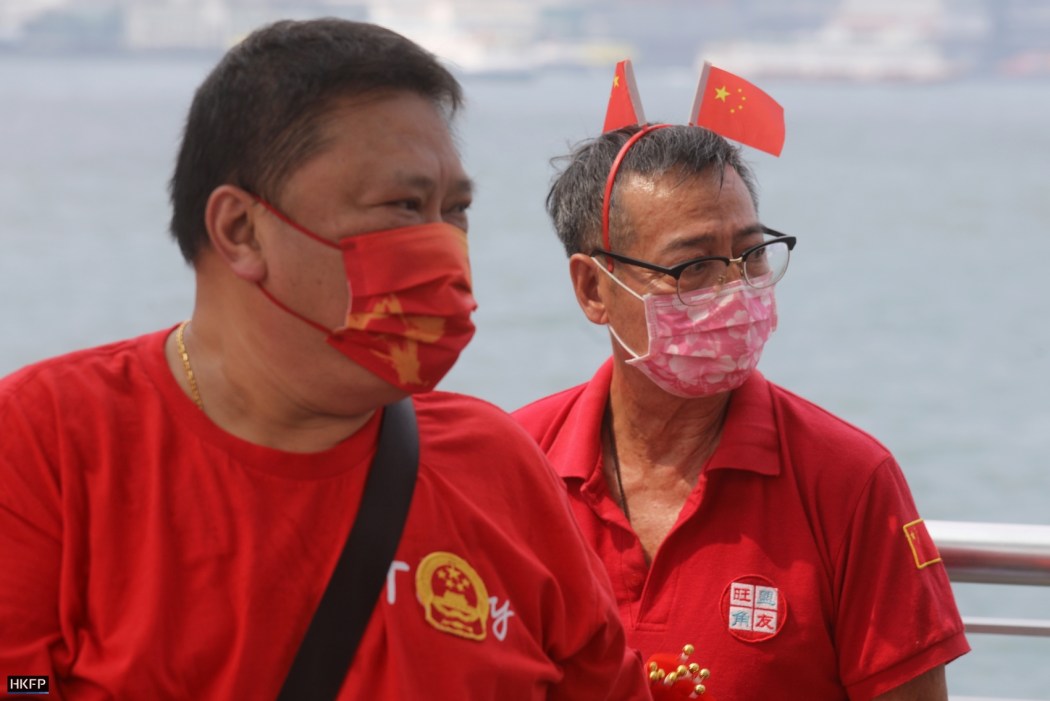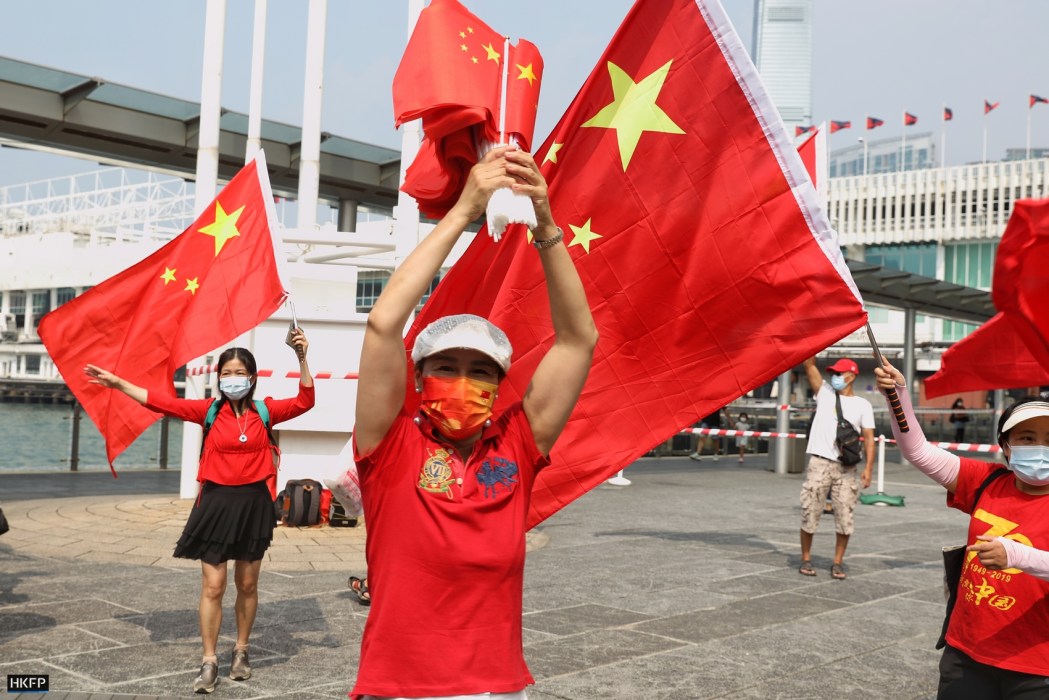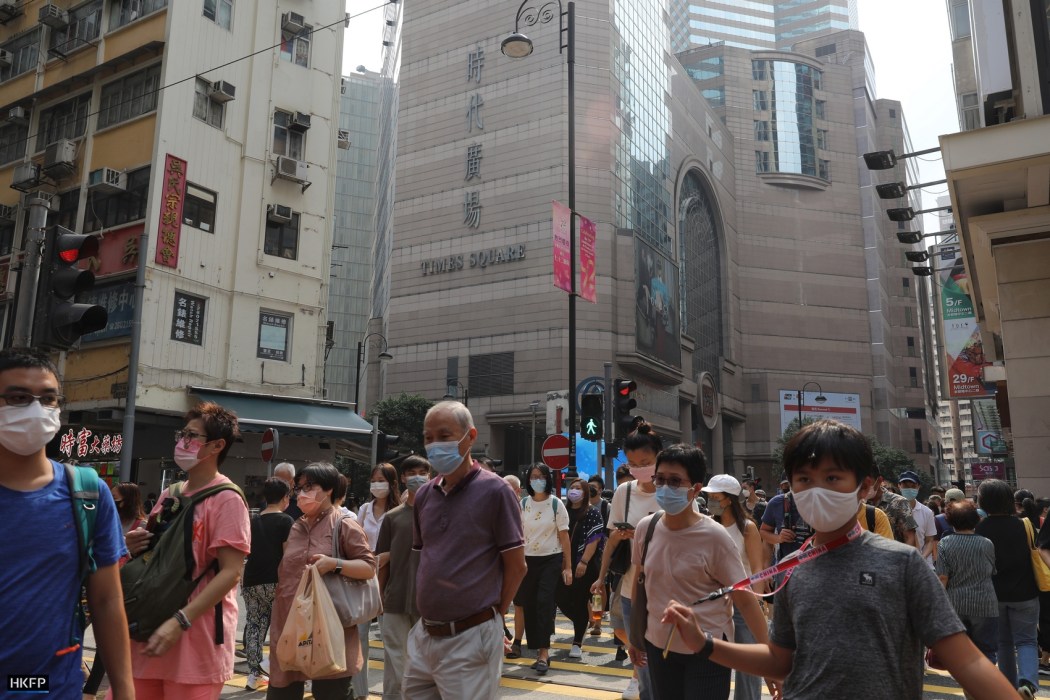After the imposition of a new National Security Law on June 30, 2020, Beijing’s election reform mandate issued earlier this year marked the next major change in Hong Kong’s way of political life.
Before the new law and the mandate, Hong Kongers had been carrying on along the course laid down when the British left in 1997. That course was spelled out by Beijing in a Basic Law intended to serve as Hong Kong ‘s constitution for at least 50 years after 1997.

Construction of the new political system is now well advanced. Its centerpiece is a 1,500-member Election Committee designed as an upgrade of the old committee. The new design, spelled out in amendments to the Basic Law, was promulgated by the central government in March. The election of people to fill in the blanks and occupy the positions that make up the committee was just held, on September 19.
This new committee is officially advertised as an “improved” version of the old, not a total remake, but it has been given many new tasks. The old 1,200-member body was mainly responsible for endorsing Beijing’s approved candidates for Hong Kong’s top government leadership position, known after 1997 as the Chief Executive. In colonial days, this position was filled by governors, who were periodically appointed and sent out from London.
The new committee will continue to do the Chief Executive honours as before and will undertake this exercise early next year. Meanwhile, the committee must see to its new responsibilities in preparation for Hong Kong’s coming Legislative Council election, to be held on December 19.
The new Election Committee is now tasked with selecting 40 of its own members to serve concurrently as members of Hong Kong’s new 90-seat local law-making body, known as the Legislative Council, or LegCo in local shorthand. Previously, the council had 70 seats, of which 35 + 5 were elected by universal suffrage on a one-person-one-vote basis.
The extra five seats were reserved for candidates nominated by and from among incumbent District Councillors. Once elected, the five then served concurrently as members of both LegCo and the District Councils.
The latter are neighbourhood-level bodies that featured in Hong Kong reformers’ drive for universal suffrage elections. Due to democrats’ takeover of the councils in 2019, they are now under a cloud of uncertainty created by the new national security regime.
In colonial days, before reforms began during the 1980s, LegCo was an entirely appointed body and the governor enjoyed wide discretionary powers, which Chief Executives do not. The colonial legislature was essentially an in-house consultative association of local elites, and Hong Kong’s newly reformed council will follow as an elaborately crafted variant in that tradition.

Beijing’s new March 2021 design eliminated the 1997 promise of progress towards a government — including both Legislative Council and Chief Executive — wholly elected by universal suffrage. That promise had been written by Beijing into Articles 45 and 68 of the Basic Law. The Article 68 promise was the authority recognised by both Beijing and Hong Kong’s pro-democracy negotiators when the extra five seats were added, in time for the 2012 LegCo election.
Besides selecting from among its own members 40 new Legislative Councillors, the new Election Committee is now tasked with endorsing the nomination of all candidates who will vie to fill the remaining 50 seats in the newly enlarged 90-seat Legislative Council.
Additionally, 30 seats are to be elected by the same small circle “functional constituencies” that have just been mobilised to create the Election Committee itself. Only 20 seats are to be elected directly by voters on a one-person, one-vote basis.
A new seven-member Vetting Committee works separately and makes the ultimate decision, up or down, on the political qualifications of each candidate. This is the final gate through which all aspiring candidates must pass and is separate from the nominating endorsements by individual members of the Election Committee. To win approval from the Vetting Committee, candidates’ records and past behavior must show proof that they do not oppose the new post-1997 political order, as Beijing defines it.
A first election day under national security rules
The first exercise under this new order — electing members of the Election Committee — did not go entirely as planned but not for the reasons anticipated.
Government officials had been so fearful of angry mobs disrupting the September 19 proceedings that a 5000-strong contingent of police officers was called out to guard the five polling stations set up around town … 5,000 police officers for 4,889 eligible voters … proclaimed the headlines. And not a protester in sight. Or at least not the disruptive kind.
Officials could not succeed in keeping absolutely everyone away, of course. And sure enough, if anyone refused to accept the new mantra that Hong Kong’s political realm is now for pro-Beijing loyalists only, it would be the likes of Hong Kong’s most defiant protester. But since the now gray-haired “Long Hair” Leung Kowk-hung is behind bars, a few of his comrades-in-arms showed up instead.
Four members from the League of Social Democrats took to the streets early on Election Day morning carrying a large protest banner. It denounced the new election arrangements and repeated the 2019 protest chant “five demands, not one less.” Universal suffrage elections was one of the demands.

The banner also featured an old Chinese saying that “a deer is not a horse.” — used for centuries to mock sycophantic officials. The reference in this case was to those who were calling the September 19 exercise an election.
The group included long-time stalwart Tsang Kin-shing, known as “the bull.” Tsang earned the nickname during his earlier younger days on the protest circuit. Police monitored their progress throughout, but the demonstrators were allowed to continue to their destination at the Hong Kong Island polling center.
In fact, there was a 90% turnout of eligible voters, or 4,380 in all. Officials hailed the peaceful orderly turnout, but then ran into immediate trouble with their mix of electronic voting machines and paper ballots. The votes could have been counted more quickly the old-fashioned way … 14 hours for 4,380 ballots … declared newspaper headlines two days later.
Stepping immediately into the lead role prepared for them by the new environment, two pro-establishment politicians were the first to call for the resignation of Hong Kong’s Electoral Affairs Commissioner, Barnabas Fung. Regina Ip, now a Legislative Councillor, is remembered as the Secretary for Security who led the government’s first attempt to pass national security legislation in 2003.
Legislative Councilor Holden Chow is a leading member of Hong Kong’s largest political party, the pro-Beijing Democratic Alliance for the Betterment and Progress of Hong Kong (DAB).
Retired judges have been appointed to chair the commission on the assumption that their decisions will be accepted more readily when the inevitable election-related disputes arise. Ip and Chow said judicial expertise was not a necessity for the job.
They did not add that in patriots-only elections, there would probably be few disputes to settle. They said only that administrative know-how was what counted most, and Fung must go.

Chow also said it was time to begin vetting more carefully the civil servants assigned to oversee work at election time — just to be sure those with questionable inclinations were excluded from such duties.
Results
The Election Committee itself is actually a masterpiece of political engineering — five sectors with 40 subsectors — spliced and diced with multiple bits and pieces that, when added up, do produce a representative cross section of Hong Kong’s patriotic community as Beijing defines it.
That definition includes committed pro-Beijing loyalists and those who are solidly pro-governing establishment, plus some who are reliably moderate. This is meant to be a fail-safe design but on the outside chance that it does fail, the new Vetting Committee is there to provide the necessary back-up.
Only three candidates from the moderate category contested the September 19 subsector election, and only one was successful. Former Democratic Party member Tik Chi-yuen just barely won a Social Welfare subsector seat in Sector Two.

Actually, he had to draw lots with another candidate. They were the two lowest scorers but received the same number of votes. Nevertheless, he continues to maintain that there is still space for people like him to speak their minds.
Of the 1,500 committee seats, 1,136 were already filled by Election Day. They included the seats reserved for officials, those directly nominated by their sponsoring organisations, and the sectors with no competing candidates. That left only 364 seats to be filled in just 13 of the 40 subsectors. The total number of candidates was 412, and the total number of ballots actually cast on September 19, was 4,380.
Election managers in most other places would have found such numbers disconcerting to say the least. But here, the September 19 exercise was hailed as a great success – well-suited for the work that lies ahead.
All the various sectors, despite the failure of most candidates to bother issuing campaign manifestos. were reportedly preparing to do their part now that Hong Kong had finally found itself on the right path.
Hailing the start of a new chapter for Hong Kong’s post-1997 “one-country, two-systems” history, Ta Kung Pao’s special edition on September 21 congratulated the 364 winners for finalising the Election Committee roster.
Cutting across all the five sectors and 40 subsector divisions, final results looked good for the governing team. The pro-Beijing DAB political party could boast 150 of its members on the new committee, making for a solid base of “politically capable, well-organised and disciplined representatives.”

Adding to that base, the pro-Beijing Federation of Trade Unions counted 76 of its members on the committee, who could in turn be counted on to represent the best interests of working people. The special edition came with a magazine section, dated September 20, that neatly summarised everything.
Sector One: Business, Industry, Finance. Its 18 subsectors had no competitors. All 300 committee members would either be occupying ex officio reserved seats, or those directly nominated by their sponsoring organisations.
Big business tycoons are concentrated in this sector with only two members of each family allowed representation. The sector is best positioned to promote Hong Kong’s economic development and cross-border ventures. Its members represent concentrated commercial strength and are able to align with national development.
Sector Two: The Professions. This sector had always given the most trouble especially from its “professional elites” in the education, legal, and social welfare subsectors. Hong Kong’s most prominent pro-democracy politicians emerged from this realm, but it has now been nicely tidied up, one way or another. The only contests on September 19, occurred in this sector where non-establishment candidate, Tik Chi-yuen, won a social welfare seat.
Sector Two’s accountants are now well positioned to assist the government in its work. There had been some doubts on this score during the 2019 protests. Engineers are the builders of Hong Kong, along with surveyors and architects.
Lawyers will now strengthen the spirit of the law and see to it that those who love China will rule Hong Kong. Medical workers support the cooperation of public and private health care. There had been some doubts about them, too, during the protests.
Sector Three: Grassroots, Labor, Religion. Except for four officially reserved seats, and the 60 directly nominated by religious bodies, all other seats were open to election. But since there were no competitors, all the nominees were automatically elected, which was what gave the Federation of Trude Unions candidates their special advantage.
Sector Four: Legislative Councilors and Others. The others include local group representatives, including those from fight crime and fire safety committees. There was also no competition in this sector. Some members will occupy reserved official seats, other nominees were unopposed.
Sales pitch for sceptical public
The pro-Beijing Bauhinia Foundation sponsored an opinion poll immediately after the election asking 1,000 people what they thought of it. Again, Ta Kung Pao did the honours, on September 24, and reported overwhelming majority approval on all counts.
Those responsible for Hong Kong’s revamped election system are nevertheless well aware that it has been received with something less than an enthusiastic response from the pro-democracy voting majority here, and from interested observers elsewhere.
The kindest thing said about the new arrangements is that they seem like some sort of joke dreamed up by policy advisors and designers in Beijing who let their imaginations run away with them.
But of course, Hong Kong’s newly reformed election system is not a joke and information officials are tapping the talents of KOLs — knowledgeable opinion leaders — to explain what the new system is expected to achieve. Prominent as usual among the promoters is Professor Lau Siu-kai, speaking for the Chinese Association of Hong Kong and Macao Studies.

His explanation is almost as convoluted as the design of the Election Committee itself. But as he sees it, the new system represents the best of both worlds. He calls it elite politics in the service of the “common people.”
Elites left to themselves govern for themselves, in their own interests. By contrast, public opinion and mass activism prevail in the popular realm. Hong Kong’s experience with popular participation in politics didn’t go so well. Chaos had ensured, so others must now step in to do what is in the best interests of all.
Lau notes that in the United States, democratic politics isn’t going so well either. As is well known, policy makers there govern in the interest of the economically advantaged, accounting for money politics and the growing disparity between rich and poor.
In Hong Kong an even worse result had ensued. The expansion of the popular arena had not led to an improvement in the lives of ordinary people because it had made the government too weak to undertake the reforms necessary to make that happen.
The government had been handicapped by being forced to focus on political issues. Beijing’s current reform initiative was aimed at rebalancing the political arena. Its poplar component has been reduced: only 20 directly-elected Legislative Councilors compared with 35+5 before.
Under the new reformed system, the elite sectors have expanded but this will not be detrimental to the interests of ordinary people. On the contrary, they will be the beneficiaries because the government will be able to work in their best interests.
He traced the whole massive shift away from Hong Kong’s post-1997 Basic Law governing design, to the decisions finalised at the Fourth Plenum of the Chinese Communist Party’s Central Committee, in late October 2019.
That was the plenum everyone here ignored because, for one thing, its decisions were announced only in perfunctory form. So the general public was unaware of their import. But additionally, Hong Kong’s anti-government protest season was then at its height, culminating in the November 2019 District Councils election that democrats won in a landslide of popular support for the protests.

But Lau traced the Fourth Plenum’s mandate further back, to the general reasoning, long cited by Beijing and long dismissed here as the usual official attempt to ignore the burning political issues at hand. Nevertheless, Lau continued on, repeating the official diagnosis for all that has gone wrong here since 1997, by way of justification for all that Beijing is now doing to set things right.
Beijing is determined to “resolve the deep-seated economic social and livelihood ‘contradictions’ or problems in Hong Kong.” These include the wealth gap, restricted upward mobility for young people, poverty, inadequate housing, and a narrow industrial base.
“Beijing fully understands that these problems are the major sources of political and social discontent and instability in Hong Kong,” wrote Lau. Beijing is determined to resolve these contradictions and is now in a position to do so.
With populist distractions eliminated, and professional and business elites brought into line, the new Election Committee can work to strengthen Beijing’s hand for the common good. The aim is to ensure that Hong Kong’s government and patriotic elites do their job well.
Thus, Hong Kong’s future will play out differently than in the West. “In short, the expansion of the elite arena in Hong Kong will benefit the common people much more than what happened in the past when the popular arena was powerful” … most especially because Beijing is determined to make it happen.
What’s more, the Election Committee’s work is never done. It will not end with the current election cycle. The committee will continuously monitor the performance of both the Chief Executive and the Legislative Council.
This should make for an interesting challenge since close to half the new Legislative Councillors will be serving concurrently as dual-use members of both the Election Committee and LegCo. But the best guarantee, as Lau sees it, is that “the new Election Committee is completely made up of patriots who wholeheartedly support Beijing and its policies toward Hong Kong.”
Support HKFP | Policies & Ethics | Error/typo? | Contact Us | Newsletter | Transparency & Annual Report | Apps
| HKFP is an impartial platform & does not necessarily share the views of opinion writers or advertisers. HKFP presents a diversity of views & regularly invites figures across the political spectrum to write for us. Press freedom is guaranteed under the Basic Law, security law, Bill of Rights and Chinese constitution. Opinion pieces aim to point out errors or defects in the government, law or policies, or aim to suggest ideas or alterations via legal means without an intention of hatred, discontent or hostility against the authorities or other communities. |
Help safeguard press freedom & keep HKFP free for all readers by supporting our team

More HKFP OPINION:
HKFP has an impartial stance, transparent funding, and balanced coverage guided by an Ethics Code and Corrections Policy.
Support press freedom & help us surpass 1,000 monthly Patrons: 100% independent, governed by an ethics code & not-for-profit.










